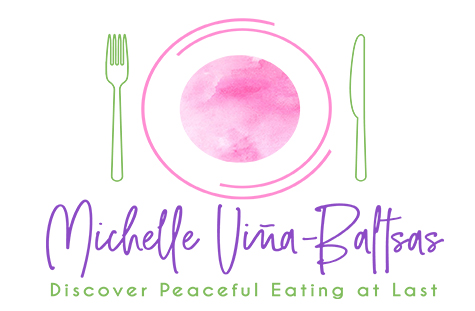One of the reasons why I love practicing Intuitive Eating is because it has given me freedom from food and negative body image. In fact, this is the main reason why clients seek out my services. They are ready to uncouple their self-worth to the number on the scale or the size of their jeans. They are ready to reclaim their lives and free up the time and energy they had previously used to count calories, fat grams, carbs, or “points”.
For those of you who aren’t familiar with intuitive eating, it’s a process that teaches you how to stop dieting and/or restricting food and start listening to your body’s internal wisdom as it relates to hunger and fullness, cravings, movement, etc.
Intuitive eating is the polar opposite of dieting because it does not have any rigid rules or “have tos”. Instead, it offers 10 principles to gently guide you out of the elusive and damaging diet culture and into food freedom.
One mistake I made when I first began practicing intuitive eating was treating the principles like rules. This is a very common experience for newbies and can be very problematic if not caught. Mistaking the principles for rules is no different than being on a diet; that rigidity still exists. After all, the primary purpose of practicing intuitive eating is to break free from diet culture so one can experience freedom, flow, and flexibility in their relationships with food and body. This can only happen when we ditch the rules, rigidity, and harsh personal judgments and start listening and trusting our bodies again.
So, how do you know if you’re making this common mistake?
One of the best ways to recognize this is to observe your language. Being mindful of how you talk and think about the principles is key. Whenever words like always, never, only, and should are used in conjunction with the intuitive eating principles, it is often a sign that rigidity, perfectionism, and food morality are present. This is the epitome of diet culture!
A few of the principles that I mistook for rules were related to hunger, fullness, and emotional eating. My clients often make the same mistakes. Over the years, I’ve heard many of my people say things like:
But I thought I should only eat when I’m hungry.
or
I’m only supposed to eat until I’m full, right?
or
I try to never eat for emotional reasons because that violates the principles.
But, when you begin to embody the principles you’ll likely discover this:
Sometimes you will eat when you’re not physically hungry just because something looks yummy and you don’t want to miss out.
Sometimes you will overeat.
Sometimes you will eat to soothe yourself.
And, it’s all okay! In fact, this is what Ellyn Satter, Registered Dietitian, family therapist, and author at the Ellyn Satter Institute describes as normal eating.
None of these examples mean that you’ve done anything “wrong” or that you’re not practicing intuitive eating the “right” way. It simply means you’re human. Intuitive eating isn’t about being “perfect” around food. It’s about developing a healthier relationship with food. The more tuned-in and open you are to listen to our body’s (hunger, fullness, satiety, etc.) and the less perfectionistic you try to be, the more relaxed and joyful your relationship with food will eventually become.
I will add that as you continue to nurture and heal this complex relationship, it’s best to make curiosity and self-compassion your daily co-pilots instead of self-judgement and perfectionism.
Please understand that if you feel that you’re frequently eating in a way that isn’t aligned with your intuition or feel that your eating is consistently uncontrollable, it’s best to seek guidance from a trained anti-diet professional.
Judging ourselves for our perceived “mistakes” and/or beliefs that we’re not doing intuitive eating “right” keeps us stuck in diet culture. When these guidelines are used as gentle parameters and not as rules, it makes room for that freedom, flow, flexibility with eating that so many of us have yearned to have. It’s no longer about “perfect” eating. It’s about doing our best to listen to our body’s cues knowing that sometimes we may not. The good news is that with intuitive eating there’s room for all of this. This is part of the beauty and delight in practicing intuitive eating. It allows us to be human and enjoy a healthful and flexible way of eating that dieting never could.

